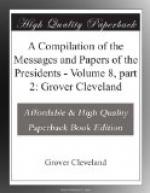By the decease of the Emperor Alexander, of Russia, which occurred contemporaneously with the commencement of the last session of Congress, the United States have been deprived of a long-tried, steady, and faithful friend. Born to the inheritance of absolute power and trained in the school of adversity, from which no power on earth, however absolute, is exempt, that monarch from his youth had been taught to feel the force and value of public opinion and to be sensible that the interests of his own Government would best be promoted by a frank and friendly intercourse with this Republic, as those of his people would be advanced by a liberal commercial intercourse with our country. A candid and confidential interchange of sentiments between him and the Government of the United States upon the affairs of Southern America took place at a period not long preceding his demise, and contributed to fix that course of policy which left to the other Governments of Europe no alternative but that of sooner or later recognizing the independence of our southern neighbors, of which the example had by the United States already been set. The ordinary diplomatic communications between his successor, the Emperor Nicholas, and the United States have suffered some interruption by the illness, departure, and subsequent decease of his minister residing here, who enjoyed, as he merited, the entire confidence of his new sovereign, as he had eminently responded to that of his predecessor. But we have had the most satisfactory assurances that the sentiments of the reigning Emperor toward the United States are altogether conformable to those which had so long and constantly animated his imperial brother, and we have reason to hope that they will serve to cement that harmony and good understanding between the two nations which, founded in congenial interests, can not but result in the advancement of the welfare and prosperity of both.
Our relations of commerce and navigation with France are, by the operation of the convention of 24th of June, 1822, with that nation, in a state of gradual and progressive improvement. Convinced by all our experience, no less than by the principles of fair and liberal reciprocity which the United States have constantly tendered to all the nations of the earth as the rule of commercial intercourse which they would universally prefer, that fair and equal competition is most conducive to the interests of both parties, the United States in the negotiation of that convention earnestly contended for a mutual renunciation of discriminating duties and charges in the ports of the two countries. Unable to obtain the immediate recognition of this principle in its full extent, after reducing the duties of discrimination so far as was found attainable it was agreed that at the expiration of two years from the 1st of October, 1822, when the convention was to go into effect, unless a notice of six months on either side should be given to the other that the convention




